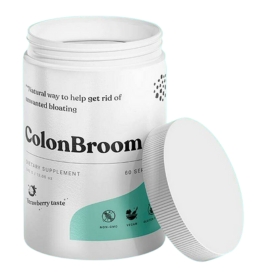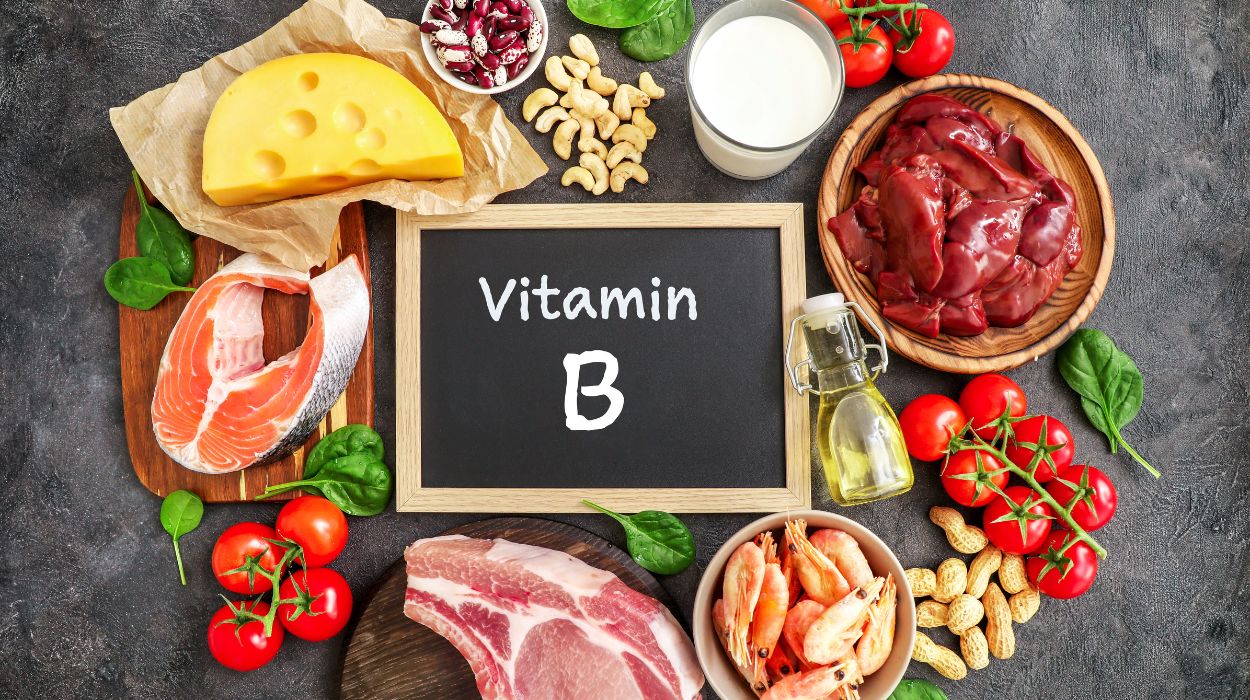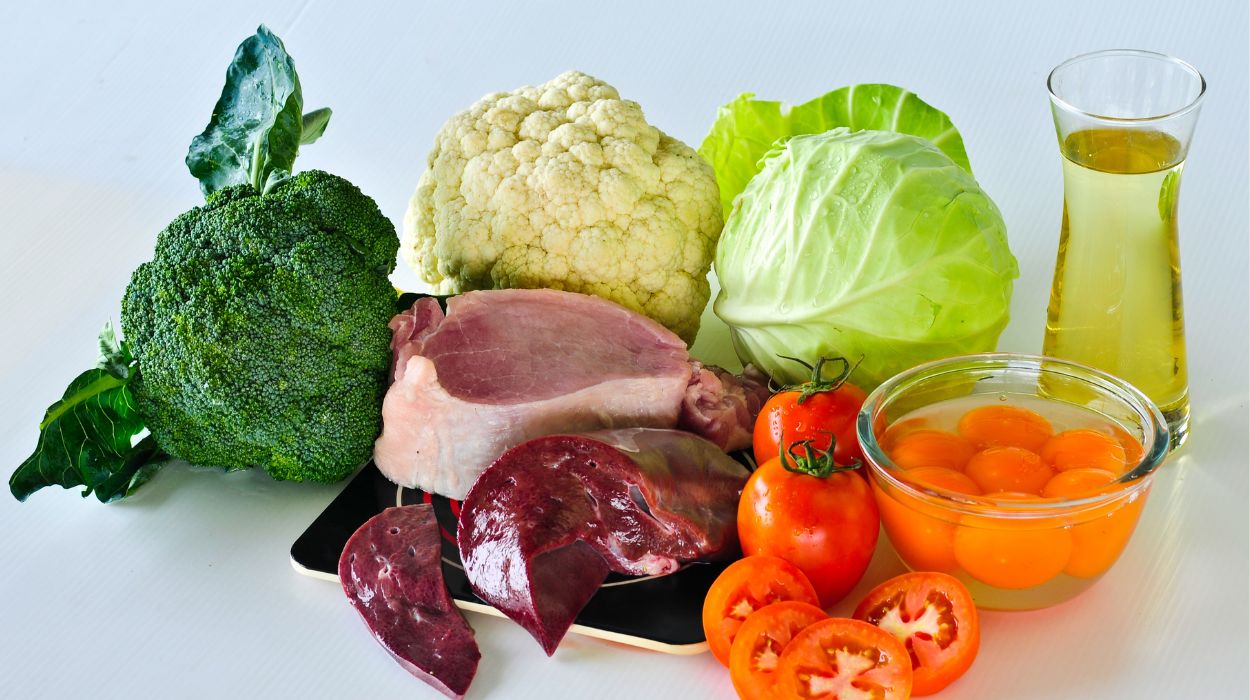
As more research emerges regarding gut microbiome, we’re beginning to realize the devastating impact poor gut health can have on the entire body. It impacts our immune function, mood, energy, and more.
In fact, digestive issues[1] account for over 100 million clinic visits in the United States each year. The root of many of these problems comes down to the food we eat. Arguably, processed and pre-packaged foods are driving the obesity epidemic and increasing digestive symptoms.
So, what can you do about it? Well, ensuring you incorporate the best vitamins for gut health in your diet can go a long way. In turn, this can help balance the gut bacteria and potentially lower overall inflammation. So, what vitamins are best?
What Are The Top 5 Vitamins For A Health Gut?
Poor gut can impact our immune system, mood, energy, and more. Yet, proper nourishment can help you avoid gut issues. The best five vitamins for a healthy gut include:
- Vitamin C.
- B Vitamins.
- Vitamin D.
- Vitamin A.
- Vitamin K.
5 Best Vitamins For Gut Health
Below, we explore the top five gut supplements. We uncover how they support beneficial bacteria in the gut, contribute to better nutrient absorption, and promote overall gut health.
FEATURED PARTNER OFFER

Colon Broom
- Reduces bloating and relieves constipation
- Improves general gut health
- Increases fiber intake
- Supports healthy cholesterol levels
- Promotes healthy circulation
Vitamin C
Vitamin C is well-known for its antioxidant and anti-inflammatory properties. Recent research identified that vitamin C[2] is associated with improved gut microbiota composition. They found that with vitamin C supplementation, there are reduced bad bacteria and increased good bacteria in the digestive tract.
This vitamin further increases the production of short-chain fatty acids,[3] which are associated with improved gut lining[4] and decreased inflammation. These short-chain fatty acids are also thought to play an important role in hormone and immune system function.
Additionally, vitamin C plays a major role in iron absorption[5] in the gut and collagen production.[6] Iron is essential for various processes in the body, such as oxygen transportation, while collagen production can improve digestive symptoms such as bloating. Collagen production[7] may also help alleviate inflammatory bowel disease and irritable bowel syndrome symptoms by improving the gut barrier.[8]
Thus, vitamin C helps support optimal gut health in several ways. It’s also an easy vitamin to obtain through a whole-food diet. Some examples of foods rich in vitamin C include citrus fruits, bell peppers, strawberries, and tomatoes.
B Vitamins

B vitamins[9] are involved in various metabolic processes, including obtaining energy from the food we eat. While often overlooked as digestive vitamins, a deficiency in B vitamins[10] may lead to an altered microbiome and the production of harmful bacteria.
Here’s a quick overview of how the B vitamins play a role in gut health:
- Vitamin B1: Also known as thiamine, this vitamin is involved in various reactions for energy production. More specifically, it aids in carbohydrate metabolism and appetite regulation.
- Vitamin B2: Also called riboflavin, this B vitamin is involved in the metabolism of fat, carbohydrates, and protein. Riboflavin deficiencies may lead to reduced cellular growth and repair, including that in the digestive tract.
- Vitamin B3: Niacin, another name for vitamin B3, is also involved in the breakdown and digestion of carbohydrates and fats, as well as alcohol. Research[9] links low vitamin B3 intake to lower bacterial diversity in the gut, which may lead to unwanted digestive symptoms.
- Vitamin B6: Also known as pyridoxine, vitamin B6 is primarily involved in amino acid, or protein, digestion.
- Vitamin B7: Known more commonly as biotin, this vitamin may have anti-inflammatory effects, impacting gut health. This particular B vitamin[11] is further linked to decreased digestive symptoms, including constipation and diarrhea.
- Vitamin B12: Cobalamine, another name for vitamin B12, is essential for proper nervous system function and the production of red blood cells. This can not only impact gut health function but also other areas of the body as well.
The B vitamins are fairly easy to obtain by eating plenty of animal and plant foods. Examples of foods rich in B vitamins include eggs, meat, fish, dark leafy greens, dairy products, seeds, and legumes. Since vitamin B cannot be stored in the body, a healthy diet should include these foods regularly.
Vitamin D
Widely known for its role in bone metabolism, vitamin D[12] has been linked with anti-inflammatory effects and gastrointestinal regulation. It’s been linked to improved gut microbiome and has been associated with reductions in digestive symptoms relating to irritable bowel syndrome, ulcerative colitis, and Crohn’s disease.
This means that those with inflammatory bowel conditions may benefit from vitamin D supplementation or a higher intake of vitamin D-rich foods.
A vitamin D supplement is commonly recommended by doctors during the darker months of the year. This is because we obtain most of our vitamin D[13] from the sun, and during the winter, we tend to get less sun. However, vitamin D can also be found in egg yolks, some fish, liver, and fortified milk.
Vitamin A
Research suggests that vitamin A and vitamin D deficiencies[14] lead to lower microbial diversity in the gut and increased risk of infections. This means vitamin A is involved in protecting the gut lining and keeping the immune system functioning optimally.
Many digestive conditions are autoimmune conditions.[15] This means that they happen due to an overreaction of the immune system, which can lead to inflammation and other symptoms in the digestive tract. However, vitamin A may help prevent these conditions from manifesting.
Fortunately, plenty of foods can help you get enough vitamin A. Some examples include leafy greens, eggs, red bell peppers, beef liver, milk, and mango.
Vitamin K

Recently, more research is emerging about the link between vitamin K and digestive health. Vitamin K2[16] is linked to good gut health because it helps to increase good bacteria in the gut and decrease inflammation. It’s proposed that it could help protect against digestive discomfort or disease.
Vitamin K2 is found in fermented foods and animal products, such as sauerkraut, eel, beef liver, chicken, cheese, and egg yolk. The added benefit of fermented foods is that they contain probiotics[17] which also have beneficial impacts on gut bacteria.
Tips To Improve Your Digestive System
Here are a few more tips to improve gut health.
- Eat plenty of fiber. Fiber[18] is essential for a healthy balance of good and bad bacteria in the gut. Foods high in fiber include brown rice, oats, fruits, vegetables, and beans.
- Drink enough water. Water is essential for reducing constipation.[19] It can help move things along in your digestive tract, aiding in both absorption and elimination.
- Reduce stress in your life. Stress[20] is largely associated with an increased risk of digestive diseases. By learning healthy ways to manage your stress, you can reduce your risk. Some examples of stress management tactics include meditation, deep breathing, yoga, exercise, and other relaxation methods.
- Eat your food slowly. Chewing each bite can help reduce gas in the digestive tract. Thus, this can eliminate discomfort or bloating after eating. Try to reduce distractions as you eat and chew each bite mindfully.
- Avoid alcohol. Alcohol consumption[21] can lead to inflammation and even bleeding in the digestive tract. If you struggle with digestive symptoms, it may be best to avoid or reduce your alcohol intake.
- Incorporate more probiotics in your diet. Probiotics,[22] such as those found in yogurt and fermented foods, have been shown to reduce digestive pain and other symptoms.
- Exercise regularly. Regular exercise can help things move along in the digestive tract, preventing constipation and other discomforts.
- Beware of your triggers. Knowing what causes your digestive problems, such as spicy food or dairy products, can help you avoid them. In turn, you can work on improving your digestive health and thwarting uncomfortable symptoms.
- Select healthy fats. It’s recommended to lower the fat in your diet if you’re having digestive issues. However, incorporating more healthy fats can help you do this, such as avocados and walnuts.
Conclusion
Gut health supplements and foods can help you regain control of your digestive health. Foods that help with bloating and other digestive symptoms often include those low in fat and whole foods. This can transform your overall health and wellness, starting with your gut.
Other avenues for improving gut health may include taking a debloat pill, exercising regularly, managing stress, and reducing your alcohol intake.
If you have been diagnosed with a digestive condition, it may also be worthwhile discussing your options with your doctor. They can advise you best on what diet would work well for you and your situation. Alternatively, they may also refer you to a nutritionist or dietician.
Frequently Asked Questions
The best vitamins for gut health include vitamin C, vitamin D, the B vitamins, vitamin K2, and vitamin A. While supplementation may help, these are best obtained from the food you eat, such as plant foods or animal products.
Vitamin D and glutamine[23] may help improve the intestinal lining and reduce the risk of a leaky gut.
There are several ways to restore your gut health, including eating fiber-rich foods, exercising, reducing your alcohol intake, reducing stress, and ensuring you get ample nutrients through your diet.
Various supplements may help repair the gut and digestive tract, including the above vitamins, glutamine, zinc, probiotics, prebiotics, collagen, and more.
Vitamin D, vitamin C, vitamin A, vitamin K2, and B vitamins may all play a role in reducing bloating and other digestive symptoms.

